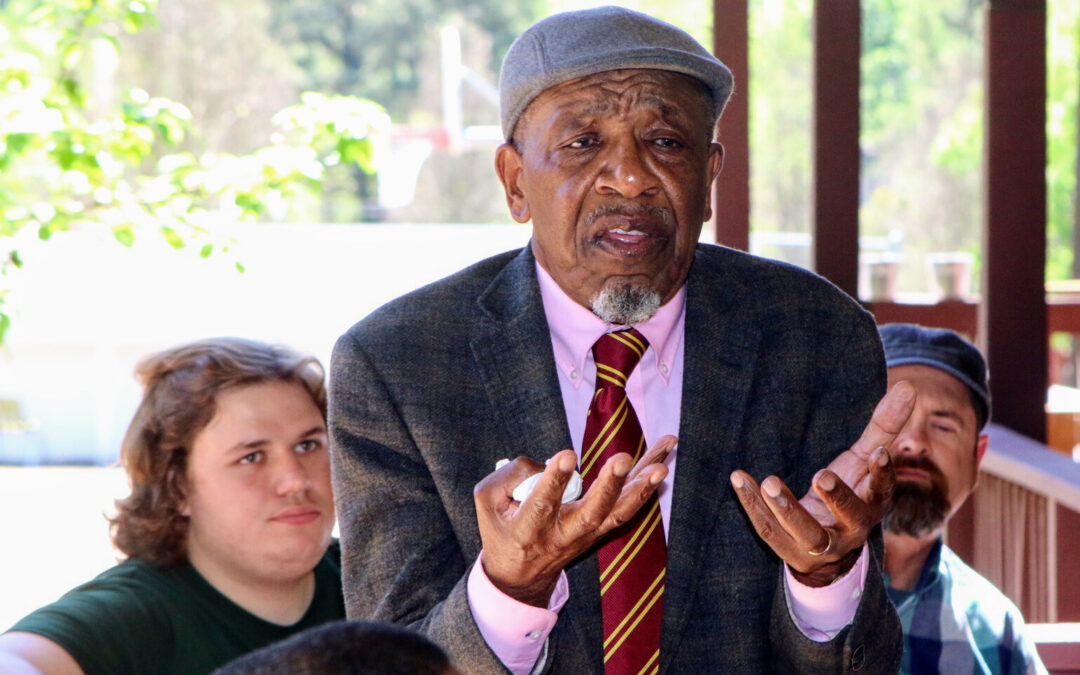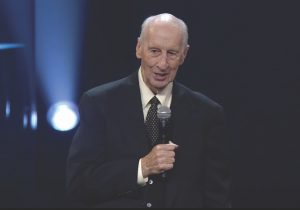
by Steve | Jan 11, 2021 | Jan-Feb 2021, Magazine, Magazine Articles

Glide Memorial United Methodist Church in San Francisco. Photo by Chris Carlsson.
By Thomas Lambrecht –
Resolution is finally in sight after two contentious years of strife between Bishop Minerva Carcaño of the California-Nevada Annual Conference (CNAC) and the leadership of Glide Memorial United Methodist Church in San Francisco, a progressive church with a well-established reputation for being the largest United Methodist church in the Western Jurisdiction and among the largest in the United States. The conflict in this situation was theological, as well as financial and related to power and control.
In a joint November statement, the two parties announced they “reached an agreement that provides for each entity to pursue different aspects of Lizzie Glide’s Trust as wholly separate and autonomous organizations.”
Both parties agree that Lizzie Glide’s trust, established in 1929, was created to “advance Christian Protestant religion, education, and charity in San Francisco. To fulfill her wishes, she installed Glide as trustee of property located at 330 Ellis Street, which she wanted used to benefit all the people of San Francisco, and to support the creation of an evangelistic training center for preaching and teaching in conformity with the doctrines of the Methodist Church.”
According to the statement, the physical property will be maintained by the Glide Foundation while the Glide Trust will be given to the California-Nevada Annual Conference to “carry out the mission of The United Methodist Church” and “advance Methodist teaching,” as well as leaving open the possibility that the annual conference will establish a new United Methodist congregation in San Francisco.
“Glide will transfer Trustee responsibility to CNAC for the Trust and will also transfer responsibility for a restricted fund that was established last century in large part to advance Methodist teachings. Combined, these accounts now contain $4.5 million in invested restricted funds that grew out of Lizzie Glide’s original contributions. The Trust will be renamed the ‘J.H. Glide United Methodist Trust’ and used to carry out the mission of The United Methodist Church – making disciples of Jesus Christ for the transformation of the world, sending persons into the world to live lovingly and justly as servants of Christ healing the sick, feeding the hungry, caring for the stranger, and freeing the oppressed.” Glide will also provide $1.5 million to CNAC, drawing from a separate account for investment returns.
Glide Memorial Church was launched into notoriety through the ministry of the Rev. Cecil Williams who served the church as lead pastor from 1964 until his “retirement” in 2000. In 1967 he removed the cross from the sanctuary in an attempt to make Jews, Muslims, Buddhists, Wiccans, and atheists/agnostics feel comfortable.
In a 2018 open letter to her annual conference, Carcaño stated, “Leaders from these [non-Christian] constituencies are quick to publicly state that they do not want the Celebrations, or the church, to be United Methodist or Christian in any form. Sunday Celebrations are uplifting concerts, but lack the fundamentals of Christian worship. Baptisms are conducted periodically but in the name of the people rather than from a Christian understanding of Baptism. Holy Communion was done away with some time ago and only introduced back into the life of the congregation this past Spring, but outside of the Celebration gatherings and with much resistance. We seek to be in good and loving relationship with persons of other faiths and beliefs, and those who claim no faith. However, this should never cause us to lose our own faith.”
According to Carcaño, “the great majority of the participants at Glide’s Sunday Celebrations claim other faiths.” Additionally, “there are also serious concerns about the governance and financial administration of the church,” Carcaño declared. “The church has no organizational structure to fulfill its responsibilities as per The Book of Discipline, and has not had a United Methodist organizational structure for decades. The only body that functions in any leadership capacity is a group of congregational leaders hand-picked by Cecil Williams who have never been elected or recognized by the congregation.”
The question became who was really running Glide? It became evident that the Glide Foundation was really the governing entity for the congregation. The Foundation receives millions of dollars a year for the social outreach ministry of the church, housing and feeding the homeless, providing ministry related to HIV/AIDS, and many other projects. In a 2018 guest editorial in the San Francisco Chronicle, Williams stated: “The Glide board of trustees controls the foundation’s resources, of which 95 percent support social programming, and 5 percent go toward church activities.”
Responding also in the Chronicle, Carcaño wrote, “In May, I attempted to appoint a senior pastor to Glide Memorial who was welcomed by the congregational leaders, but rejected by the Board of Trustees of the Glide Foundation.”
Despite the fact that there have been four lead pastors appointed to the church since 2000, including now-Bishop Karen Oliveto, Williams has continued to maintain leadership of the church and the Foundation. Two years ago, Carcaño described it this way: “No pastor has been allowed to exercise their rightful authority or responsibilities while serving at Glide. To this day, Cecil Williams and his wife, Janice Mirikitani, make all decisions in the background at Glide.”
As the conflict deepened, the Foundation acted to strip any mention of The United Methodist Church from its articles of incorporation in 2018, according to the Chronicle. Glide also removed the resident bishop from the board and specified that only funds and assets related to church operations would be held in trust for the denomination.
“As United Methodists, we respect all faiths, love all people, and are committed to working with persons of other faiths and goodwill to make the world a better place,” wrote Carcaño. “We also want to sustain our beliefs as Methodists.”
In their November joint statement, the parties appear to put the acrimonious past behind them. “Both CNAC and GLIDE are hopeful for a timely and successful approval by the Court followed by a new chapter in fulfilling Lizzie Glide’s wishes for future generations.”
Thomas Lambrecht is a United Methodist clergyperson and the vice president of Good News.

by Steve | Jan 11, 2021 | Jan-Feb 2021, Magazine, Magazine Articles
Popes, Politicians & John Perkins
By Courtney Lott
2021
In 1972, Time magazine implemented what is now known as “Person of the Year.” Far from an automatic honor, this distinction merely designates someone as a representation of the year that has just passed. From popes to politicians, the list of those who have graced the cover includes powerful, and often power-hungry, men and women.
In response to this often-notorious award, World magazine established the “Daniel of the Year.” Over the last 23 years, honorees from the Christian news publication have included individuals such as missionary Andrew Brunson, humanitarian Baroness Caroline Cox, and persecuted Christians in China and Syria.
This year’s Daniel Award went to Dr. John Perkins, a longtime inspiration to many of the staff of Good News. Born in 1930, in Mississippi, Perkins saw and experienced some of the worst of racial tensions in the South. At sixteen, his twenty-five-year-old brother was shot by police, and by the time he left for California in 1947, he had “learned to hate all the white people in Mississippi.”
This, however, was not to last. God came calling when Perkins’ son Spencer came home from Bible classes singing “Jesus Loves the Little Children” – “red and yellow, black and white.” Curiosity-driven, Perkins dove into his own studies of the scriptures, and soon, professed faith in Christ.
“If I had not met Jesus I would have died carrying that heavy burden of hate to my grave,” Perkins says. “But he began to strip it away, layer by layer.”
Three years later, when the Perkins family returned to Mississippi, they set out to change things through nonviolent protest. Over the next decade, Perkins would become a prolific civil rights leader. He worked to support voter registration efforts in 1965, school desegregation in 1967, and in 1969 led a boycott of white-owned stores that welcomed black customers but refused to hire them.
Sticking to the path of nonviolence did not come easy. The temptation to fall back into his former hatred returned in 1970 when a group of officers nearly beat him to death in response to his civil rights efforts.
“They stuck a fork up his nose and down his throat,” writes Marvin Olasky of World. “They beat him to the floor, then kept on kicking him in the head, ribs, stomach, and groin.”
God used the hospital staff who treated his injuries to keep him from sliding. Nurses and doctors – both black and white – washed his wounds, helped him heal. They were symbolic of the people who had beaten him, Perkins writes in his book One Blood. What they did healed more than his body, it healed his heart.
“Nonviolence takes more strength than violence,” said Perkins, “and it takes more than just human strength. It takes God’s strength working in human beings to produce self-control, gentleness, and other fruit of the Holy Spirit.”
God also worked to produce a heart of compassion in him. The pain of parental abandonment created a particular soft spot for the outcast, the outsider, those left behind. Perkins describes rejection as a sort of internal death that occurs again and again but rejoices that it is for this kind of person that Jesus comes.
“I know what it feels like to be at the low end of the totem pole. I know what it feels like when ‘good’ people look down their noses at you. Something on the inside dies over and over again. I love it that Jesus comes after those kinds of folks. … If God Himself loves and wants the outcasts, why don’t we?”
In an effort to respond to this convicting question, Perkins founded Voice of Calvary and Mendenhall Ministries. These two organizations have developed clinics and theology classes, created a housing cooperative, and opened thrift stores. In order to expand their reach, and to become more effective, Perkins also created the Harambee Christian Family Center, the John and Vera Mae Perkins Foundation, and the Christian Community Development Association.
God-given gentleness and compassion are at the heart of Perkins’ answer to racial reconciliation in our country. It is Christ who heals all wounds, who changes hearts, who makes us whole. However, we are also called to look inward, take stock, and then to act.
“The fruit of the Spirit is gentleness,” Perkins said. “It’s pretty hard to find this quality on display today. Our culture applauds people who are brash and arrogant. The self-promoter gets the most attention and the most encouragement. But God intends for His friends to be marked by gentleness.”
According to Perkins, biblical reconciliation affirms that “every human being is 99.9 percent identical in genetic make up. … All people, all kindred, all nations, all tongues. One blood.”
Repentance is also necessary for biblical reconciliation, according to Perkins, and he lets no one off the proverbial hook. From the damaging long-term effects of segregation to redlining in housing development, the white community needs to take responsibility for abusing its power. But, Perkins believes, the black community must also pause for personal assessment as well. He laments the “epidemic of violence within our own African American community [and] the breakdown of our families … We the Church are called to be the light that shines in these dark places.”
With such a life of forgiveness and passion for justice, it is no wonder he was designated as 2020’s Daniel of the Year. His patience and persistence is a model for our time.
“If we are going to help others understand who Jesus is, our own lives must reflect his character and love,” Perkins observes about our polarized culture. “It is at this precise moment that the watching world gets a glimpse of him.”
Courtney Lott is the editorial assistant at Good News. Photo: John Perkins preaching — courtesy of the John & Vera Mae Perkins Foundation.

by Steve | Jan 11, 2021 | Jan-Feb 2021, Magazine, Magazine Articles

Pastor Jack Hayford being honored and presented an award at Gateway Church by Pastor Robert Morris in 2017. Originally launched in Los Angeles, The King’s University, a school founded by Hayford, is now located in Southlake, Texas, at Gateway Church.
By Steve Beard
Over the last 40 years, one of the most popular modern day hymns is “Majesty, Worship His Majesty” written by Jack Hayford. Congregations from all denominations around the globe have sung it with reverence and gusto.
Included in The United Methodist Hymnal, the song was written in 1977 while Hayford and his family were vacationing through England during the 25th anniversary of the coronation of Queen Elizabeth. As they roamed through historic Blenheim Palace, the birthplace and ancestral home of Winston Churchill, Hayford was inspired by the regal surroundings.
Thinking from the heart, he became mindful “that the provisions of Christ for the believer not only included the forgiveness for sin, but provided a restoration to a royal relationship with God as sons and daughters born into the family through His Majesty, Our Savior Jesus Christ.”
As he was driving around England, Jack asked his beloved wife Anna to write down the words and melody. “So exalt, lift up on high, the name of Jesus/ Magnify, come glorify Christ Jesus, the King.”
Hayford was filled with a powerful “sense of Christ Jesus’ royalty, dignity, and majesty …. I seemed to feel something new of what it meant to be his! The accomplished triumph of his Cross has not only unlocked us from the chains of our own bondage and restored us to fellowship with the Father, but he has also unfolded to us a life of authority over sin and hell and raised us to partnership with him in his Throne – Now!”
This is one of the many insights in Pastor Jack, the exceptional new biography of Hayford and his remarkable and prolific ministry as pastor, Bible teacher, author of 50 books, writer of more than 600 worship songs, church leader, and Christian statesman. It details the struggles and triumphs over Hayford’s 30 year pastoral guidance of The Church on the Way, his denominational commitment to The Foursquare Church, and to his larger role as an irreplaceable bridge-builder between Pentecostal/charismatic believers and the wider ecumenical Church.
Quite fittingly, Hayford’s international notoriety sprung from the memorable worship song. His thoughts on worship are a key factor in comprehending the longevity of his ministry. “In both the Old and New Testaments,” Hayford taught, “God’s revealed will in calling his people together was that they might experience his presence and power – not a spectacle or sensation, but in a discovery of his will through encounter and impact.”
As a leader, Hayford was also faithfully committed to prayer, biblical exposition, racial reconciliation, teaching on the Kingdom of God, pursuing a supernatural ministry through a “crucified life,” praying for churches and leaders outside his own Pentecostal tradition, discerning the difference between “holy humanness and human holiness,” developing a “passion for fullness,” teaching on the “beauty of spiritual language” (speaking in tongues), and maintaining irrevocable honesty in his heart.
“My commitment to walk with integrity of heart calls me to refuse to allow the most minor deviations from honesty with myself, with the facts, and most of all, with the Holy Spirit’s corrections,” Hayford believed.
Hayford, 86 years old, “sees his private prayer life as the essential foundation of his ministry, and he deeply yearns to know and please God and live in radical dependence,” wrote biographer S. David Moore in Pastor Jack. “His journals are filled with prayers of confession, praise, and especially lament for his weaknesses and shortcomings. And yet almost always his journal entries end with grateful affirmation of God’s faithfulness to his promises. He is a devoted disciple of Jesus.”
“There is, in whatever one studies of Jesus, everything of humanity and nothing of superficiality; everything of godliness and nothing of religiosity,” wrote Hayford. “Jesus ministered the joy, life, health and glory of his Kingdom in the most practical, tasteful ways. There is nothing of the flawed habit of hollow holiness or pasted-on piety that characterizes much of the Christianity the world encounters.” 
Authentic discipleship, to be “Spirit-formed” as Hayford calls it, involves nurturing an intimate relationship with God. In his relationship with Jesus, Hayford committed himself “to seek him daily (1) to lead and direct my path, (2) to teach and correct my thoughts and words, (3) to keep and protect my soul, and (4) to shape and perfect my life.”
Hayford’s love and concern for clergy of all traditions earned him the title of “pastor to pastors.” Despite coming from a relatively small classical Pentecostal denomination, his generous spirit had wide appeal.
“Jack lived in a God-charged, open universe that challenged the reductionism of the modern world,” wrote Moore. “At a time in which reality came to be defined in purely naturalistic terms, dismissing the supernatural as antiquated folklore, Jack Hayford’s life and ministry offered a recovery of the biblical world, a world in which God is active and present in his creation.”
Whether he was teaching before 40,000 clergy in a football stadium or hosting a dozen pastors in his living room, Hayford was honored, appreciated, and respected. “For pastors of all stripes, whether Pentecostals or evangelicals, Jack made the voice of God and the supernatural world of the Bible seem so normal. He carefully explained the way he heard God speak, as his mother had to him, in terms that modern minds could make sense of. He also gave permission to pastors to see the work of the Holy Spirit in enlivening the biblical text so that it spoke to the present in meaningful ways.”
Steve Beard is the editor of Good News.

by Steve | Jan 11, 2021 | Jan-Feb 2021, Magazine, Magazine Articles
 By Max S. Wilkins –
By Max S. Wilkins –
“And now I have a word for you who brashly announce, ‘Today – at the latest, tomorrow – we’re off to such and such a city for the year. We’re going to start a business and make a lot of money.’ You don’t know the first thing about tomorrow. You’re nothing but a wisp of fog, catching a brief bit of sun before disappearing. Instead, make it a habit to say, ‘If the Master wills it and we’re still alive, we’ll do this or that’” (James 4:13-15, The Message).
As I read these words of James, I am struck by how timely they are for our lives. If 2020 proved anything, it clearly demonstrated that all our plans are subject to change. Not one of us knows what tomorrow holds. Yet, as the adage attests, “we may not know what the future holds, but we know Who holds the future!”
As surprising as so many of the events of this past year have been, we can rest assured that God was not surprised. As Proverbs asserts, “wise men and women plan their ways, but the Lord orders their steps.” Those of us who walk by faith, also walk in the sure knowledge that God is still on the Throne; that the Glory of God still fills the whole earth; that the Kingdom of God is still unfolding all around us; that the Lord who saved us by his grace also created us for good works which he prepared beforehand for us to walk in; and that he who began a good work in us is able to bring it to completion.
It has been a blessing to see the resilience of God’s people, watching as so many have drawn deeply from our faith and the strength of the Lord. Multitudes have also reached out in love, care, and mutual support within our communities and among our neighbors. Together we have grieved our many losses, mourned with one another, battened down the hatches, done damage control, found reserves of patience and perseverance, and managed an acute crisis with grace and excellence.
Some have been forced to make serious life changes, others have suffered significant loss, and many had to put a hold on major life events, hopes, and dreams – if not cancel them altogether. These things are all real, and we have the need to be gracious and understanding with ourselves and with each other as we experience them together. Yet, by God’s grace, those reading this are all still here, still alive, and far from simply surviving adrift in a sea of confusion, we all are still called, chosen, filled with the Spirit, and able to be the incarnational witnesses we know we are called to be.
I read recently about how, during an ongoing crisis, both individuals and organizations must begin by doing acute crisis management. The fires must be doused, we need to figure out how to survive, and we often pull inward and prepare to ride out the storm. But when a crisis lingers, and particularly when it appears to be open-ended and ongoing, a shift in approach is called for.
Some people will effectively move from acute crisis management to adaptive management. Those who are able to make that shift understand that things are not “going back to normal.” They will grasp that the world has changed, is changing, and that while there is a future and a hope, it will not look like what was left behind. Out of this understanding will emerge new ways and new opportunities. They need not be looked upon as bad things. We do, after all, worship a Lord who said at the end of our Bible, “Behold, I am making all things new.” Everyone who is called to join Jesus in his mission will spend an eternity joining the Lord in new things. Making the shift to adaptive management will often lead us to see that the opportunities are greater than the losses. We will find ways to thrive.
Many in the Church have fixed their eyes on Jesus, looked for what he is doing right where they are, and joined Jesus in those things. The result is amazing ministry, life change, and loving community breaking forth all around us. In many places the Church is not just surviving but thriving in these uncertain times. This is not to minimize the very real grief, suffering, loss, and challenge that so many experience. We will need to remain gracious and understanding with ourselves and one another in these trying times. Yet, God continues to fill us with passion, with purpose, and with opportunities for Kingdom witness. As John Wesley said with his last breath, just moments before he died, “Best of all, God is with us!”
Max A. Wilkins serves as the president at TMS Global. To learn more visit www.tms-global.org.

by Steve | Jan 11, 2021 | Jan-Feb 2021, Magazine, Magazine Articles
 By B.J. Funk –
By B.J. Funk –
Have you ever been to the Church of Cotton Candy Christianity? Hopefully, there’s not one in your town, though they sometime show up in the best of neighborhoods. Cotton Candy Christianity is a belief that holds no substance and a whole lot of sugary fluff. It dresses up in beautiful pastel colors, enticing you to taste its delicious flavor. However, the contents melt in your mouth as soon as you take your first bite. You are left with no nourishment. But your senses have been stimulated, making you want to ask for more.
Most people go to church looking for real answers to their heaviest needs. The church seeks to teach people how to journey deep down inside themselves, into that black pool where pain dwells, into those places that cannot find satisfaction with entertainment, technology, money, or food. In those places, the church’s input becomes paramount. There, life and death understandings take on a 911 call. In those wilderness places, the message of Christianity is the only answer that will bring peace. In those hungry places, the Bible touches us with solid guidance and real soul food.
My friend’s five-year-old granddaughter encourages me. Savannah says, slowly and seriously, “It just grieves my heart when my friends don’t know Jesus.” We may smile at her sweet sincerity, but Savannah has caught on to something essential. The difference is Jesus.
Jesus Christ cannot live inside of Cotton Candy Christianity. He lives inside of you, inside of the real, live, beating hearts that hurt, cry, and seek answers. We cannot afford to settle for teachings without substance. Hungry sinners need solid food. The nourishment we need is found in only one place: Jesus.
By comparison, fluff dangles the colored, tasty cones over your face, brushing you with the delicious smell until before you know it, you are a believer! A believer in fluff, that is. No one bothers to tell you that fluff doesn’t last. Only Jesus, and him crucified will bring lasting satisfaction. But you don’t know that. The Church of Cotton Candy knows, but they’re not talking.
You pick up on the hype, the chants glorifying fluff and the songs that bring a twisted message of Christianity. All of the people around you are so happy that it doesn’t take long before you are happy too. You’re just not sure why. The organ music reminds you of those days long ago when as a child you went to the circus. When your daddy took you, and he bought you candy apples, popcorn, and, of course, cotton candy. You indulged with what looked good, just as this church does for you now.
Then, a more serious moment comes, as fluff worshipers take their seat for the morning message. It doesn’t really matter what the preacher says because you have already committed yourself to this preacher’s view. When you walk out today, you have received exactly what you came for: nothing.
But that’s okay with you. You like to live life on the safe side. If you take away something from the sermon and if by chance … God forbid … you begin to think, then you stand to lose. You might be ridiculed for taking a stand. You might begin to feel a stirring in your heart. Each of those variables is way too risky. You leave satisfied. You got what you came for.
But you missed everything. Here’s what Streams in the Desert says you missed by attending the Church of Cotton Candy: “Yet the heartstrings of their old nature have not been broken, and their unyielding character, which they inherited from Adam, has not been ground to powder. Their soul has not throbbed with the lonely, gushing groans of Gethsemane. Having no scars from their death on Calvary, they will exhibit nothing of the soft, sweet, restful, victorious, overflowing, and triumphant life that flows like a spring morning from an empty tomb.”
Lord Jesus, take my love for you into the deepest places of my soul. Break my heartstrings, ground my old nature, and hold me accountable. Pull me into a deeper hunger for you. Grant me the scars of Calvary, and if I even get on the outskirts of a church that doesn’t proclaim your holy name, grind me even harder. To thine be the glory. Amen.
B.J. Funk is Good News’ long-time devotional columnist and author of It’s A Good Day for Grace.






 By Max S. Wilkins –
By Max S. Wilkins – By B.J. Funk –
By B.J. Funk –